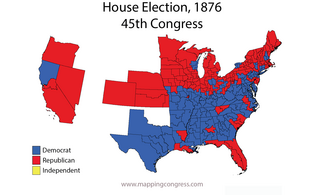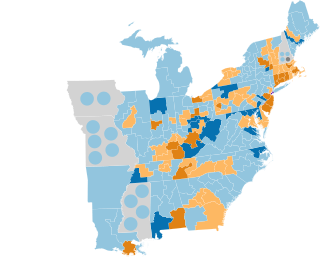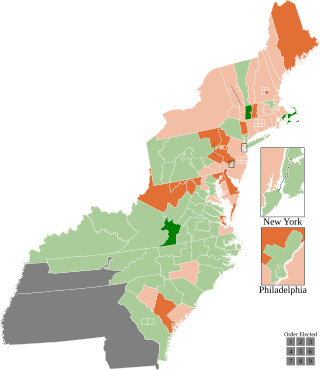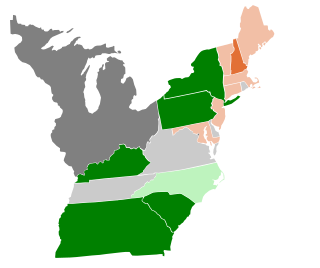Related Research Articles
The 1908 United States House of Representatives elections were held for the most part on November 3, 1908, with Oregon, Maine, and Vermont holding theirs early in either June or September. They coincided with the 1908 United States presidential election, which William Howard Taft won. Elections were held for all 391 seats of the United States House of Representatives, representing 46 states, to serve in the 61st United States Congress.

The 1876–77 United States House of Representatives elections were held on various dates in various states between June 5, 1876, and March 13, 1877. Each state set its own date for its elections to the House of Representatives before the first session of the 45th United States Congress convened on October 15, 1877. The size of the House increased to 293 seats with the addition of the new state of Colorado.

The 1868–69 United States House of Representatives elections were held on various dates in various states between June 1, 1868, to August 2, 1869. Each state set its own date for its elections to the House of Representatives before or after the first session of the 41st United States Congress convened on March 4, 1869. They coincided with the 1868 United States presidential election, which was won by Ulysses S. Grant. Elections were held for all 243 seats, representing 37 states. All of the former Confederate states were represented in Congress for the first time since they seceded from the Union.

The 1846–47 United States House of Representatives elections were held on various dates in various states between August 2, 1846, and November 2, 1847. Each state set its own date for its elections to the House of Representatives. 228 elected members representing 29 states took their seats when the first session of the 30th United States Congress convened December 6, 1847. The new states of Iowa and Texas elected their first representatives during this election cycle. These elections were held during President James K. Polk's term.

The 1844–45 United States House of Representatives elections were held on various dates in various states between July 1, 1844, and November 4, 1845. Each state set its own date for its elections to the House of Representatives. 224 elected members representing 27 states took their seats when the first session of the 29th United States Congress convened on December 1, 1845. The new state of Florida elected its first representative during this election cycle, while one vacancy in New Hampshire's delegation remained unfilled for the duration of the 29th Congress.

The 1838–39 United States House of Representatives elections were held on various dates in various states between July 2, 1838, and November 5, 1839. Each state set its own date for its elections to the House of Representatives before the first session of the 26th United States Congress convened on December 2, 1839. They occurred during President Martin Van Buren's term. Elections were held for all 242 seats, representing 26 states.
The 1836–37 United States House of Representatives elections were held on various dates in various states between July 4, 1836, and November 7, 1837. Each state set its own date for its elections to the House of Representatives, either before or after the first session of the 25th United States Congress convened on September 4, 1837. With Arkansas and Michigan officially achieving statehood in 1836 and 1837, respectively, the size of the House was set at 242 seats.

The 1834–35 United States House of Representatives elections were held on various dates in various states between July 7, 1834, and November 5, 1835. Each state set its own date for its elections to the House of Representatives before the first session of the 24th United States Congress convened on December 7, 1835. They were held during President Andrew Jackson's second term. Elections were held for 240 seats that represented 24 states, as well as the at-large-district seat for the pending new state of Michigan.

The 1830–31 United States House of Representatives elections were held on various dates in various states between July 5, 1830, and October 3, 1831. Each state set its own date for its elections to the House of Representatives before the first session of the 22nd United States Congress convened on December 5, 1831. Elections were held for all 213 seats, representing 24 states.

The 1824–25 United States House of Representatives elections were held on various dates in various states between July 7, 1824, and August 30, 1825. Each state set its own date for its elections to the House of Representatives before the first session of the 19th United States Congress convened on December 5, 1825. Elections were held for all 213 seats, representing 24 states.

The 1802–03 United States House of Representatives elections were held on various dates in various states between April 26, 1802 and December 14, 1803. Each state set its own date for its elections to the House of Representatives, either before or after the first session of the 8th United States Congress convened on October 17, 1803. They occurred during President Thomas Jefferson's first term in office.

The 1800–01 United States House of Representatives elections were held on various dates in various states between April 29, 1800, and August 1, 1801. Each state set its own date for its elections to the House of Representatives before the first session of the 7th United States Congress convened on December 7, 1801. They were held at the same time as the 1800 presidential election, in which Vice President Thomas Jefferson, a Democratic Republican, defeated incumbent President John Adams, a Federalist. Elections were held for all 106 seats, representing 15 states.

The 1796–97 United States House of Representatives elections took place in the various states took place between August 12, 1796, and October 15, 1797. Each state set its own date for its elections to the House of Representatives. The size of the House increased to 106 seats after Tennessee became the 16th state to join the union. The first session of the 5th United States Congress was convened on May 15, 1797, at the proclamation of the new President of the United States, John Adams. Since Kentucky and Tennessee had not yet voted, they were unrepresented until the second session began on November 13, 1797.
Thomas Petters Carnes was an American lawyer and politician from Franklin County, Georgia. He served as a colonel in the Maryland Line during the American Revolution and received bounty land in Franklin County for his service.

The 1800–01 United States Senate elections were held on various dates in various states, coinciding with Thomas Jefferson being elected to the White House. As these U.S. Senate elections were prior to the ratification of the Seventeenth Amendment in 1913, senators were chosen by state legislatures. Senators were elected over a wide range of time throughout 1800 and 1801, and a seat may have been filled months late or remained vacant due to legislative deadlock. In these elections, terms were up for the senators in Class 3.

A special election was held in New Hampshire's at-large congressional district on August 28, 1797, to fill a vacancy created by the resignation of Jeremiah Smith (F) on July 26 of the same year. Smith had been appointed United States Attorney for the District of New Hampshire.
A special election was held in New Hampshire's at-large congressional district on November 18, 1799, to replace a vacancy caused by Peleg Sprague (F) declining to serve in the 6th Congress.
There were four elections to the United States House of Representatives in 1959, all during the 86th United States Congress. Three of them were special elections to fill vacancies, and the fourth was to fill a seat for the new state of Hawaii. There were no special elections to the 85th Congress in 1959.
There were eight special elections in 1891 in the United States House of Representatives to the 52nd United States Congress.
There were special elections to the United States House of Representatives in 1931 to the 71st United States Congress and 72nd United States Congress. After the 1930 House elections, the Republicans held a narrow majority of 218 seats, the smallest possible majority in congress. However, following these elections, the Democrats gained 3 seats resulting in a Democratic House majority. This Democratic majority was only further increased in the 1932 house elections and would survive for 63 years, with the Republicans only briefly holding the House following the 1946 and 1952 House elections. Republicans would only hold House control for a significant amount of time following the Republican Revolution of 1994.